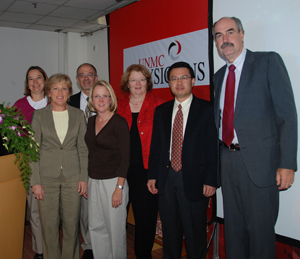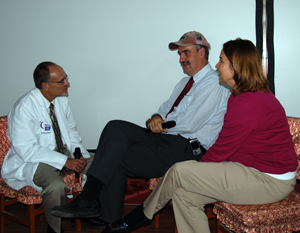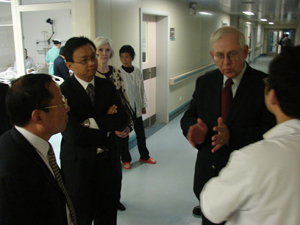 |
UNMC participants in the Family Medicine short course in Xi’an were, from left, Connie Harrison, Jayme Nekuda, Jeff Harrison, M.D., Christine Anderson, Audrey Paulman, M.D., Kai Fu, M.D., and Paul Paulman, M.D. Nearly 300 Chinese physicians gave up their weekend to attend the two-day course, which received rave reviews from all in attendance. |
 |
Jeff Harrison, M.D., left, plays the role of family medicine physician as he meets with two simulated patients, Herbert Husker (Paul Paulman, M.D.) and his wife, Helen (Connie Harrison). The role playing exercise demonstrated to the Chinese physicians in attendance how family medicine physicians deal with their patients. |
 |
Don Leuenberger, vice chancellor for business and finance, second from right, tours the First Affiliated Hospital of the Medical College of Xi’an Jiaotong University on Sunday. He toured the hospital with, from left, Jianqun Yan, M.D., Ph.D., president of the Xi’an Jiaotong University Health Sciences Center, and Jialin Zheng, M.D., director of UNMC’s Asia Pacific Rim Development Program. |
After months of planning, the team traveled to Xi’an, a major city that dates back more than 5,000 years in Chinese history, to present a two-day course on public health, rural and family medicine this past weekend.
The course, which was held at the Xi’an Jiaotong University School of Medicine, was attended by nearly 300 family physicians from the largely rural Shaanxi province of China. Some attendees came from as far as 500 miles away.
“Everyone was thrilled with the response,” said Audrey Paulman, M.D., clinical associate professor in the UNMC Department of Family Medicine and co-director of the course along with Kai Fu, M.D., Ph.D, assistant professor, pathology and microbiology. “To get this many physicians to give up their weekend shows the high level of interest in the course.”
Administrators at Xi’an Jiaotong University School of Medicine praised the course and were grateful for UNMC’s willingness to collaborate on the project.
“This is very important for the Chinese government and for the Chinese people,” said Dalin He, M.D., vice president of the First Affiliated Hospital of the Medical College of Xi’an Jiaotong University.
The Chinese health care system is administered through the Chinese government. The country has a population of more than 1.3 billion people. Xi’an, which served as the capital of China under 13 Chinese dynasties, has a population of more than 2.6 million.
Under the Chinese medical system, there are three levels of hospitals. The two levels of hospitals and clinics that are most geographically accessible to the population are the village service centers and social hospitals. The highest level would be a tertiary care facility such as Xi’an Jiaotong University School of Medicine.
“The current China system has evolved in a way that values specialists more than generalists,” Dr. Paulman said. “What has occurred is that people are going to the high-level specialists, even when they have a less complex, straightforward illness, such as uncomplicated high blood pressure, a urinary tract infection or chronic diabetes management. This can lead to more expensive care for patients.”
The model of care introduced by the UNMC team would shift more routine health care problems to the village care centers and social hospitals and try to avoid clogging the tertiary facilities with these lesser conditions.
“What we’ve done here could be a model for Shaanxi province as well as for 5 or 6 other provinces in northwest China,” said Don Leuenberger, UNMC vice chancellor for business and finance and the lead member of the UNMC contingent going to China.
In addition to Drs. Paulman and Fu, the UNMC team included: two other family medicine physicians, Paul Paulman, M.D., professor, and Jeff Harrison, M.D., associate professor; Keith Mueller, Ph.D., interim dean of the College of Public Health; and Jayme Nekuda, division director, benefits and work life programs.
“China is definitely a country in transition,” Dr. Harrison said. “This new family medicine model would represent a major cultural leap.”
Initially, UNMC will provide some new direction in the medical education program at Xi’an Jiao Tong University School of Medicine.
“Disease is the same everywhere,” Dr. Paul Paulman said. “It’s the approach to the disease that is different. The family medicine approach involves what we call the four C’s — contact with patient, comprehensive care, continuous care, and care in the context of the patient’s family.
“We can help Chinese medical students develop the community and relationship skills they need. In turn, we hope these students can help educate future generations of physicians.”
Prior to the two-day course, the UNMC team toured two social hospitals in Xi’an to try to get a better feel for what these hospitals were like. Christine Anderson, a nurse anesthetist in the UNMC Department of Anesthesiology, joined the team to make an assessment of the hospital operating rooms.
“The social hospitals we toured were excellent facilities with well-trained physicians providing state-of-the-art care,” Dr. Harrison said. “The problem is that not enough people are using them. The current mindset is to just go to the best hospital.”
|
|
Students in China enter medical school after they finish high school, Dr. Harrison said, and they have a variety of options available, including five, seven and eight-year programs. Unlike U.S. physicians, Chinese physicians do not take several years of residency training after they finish medical school.
“The Chinese doctors attending the course asked a lot of questions,” Dr. Paul Paulman said. “We were amazed to get this kind of open access. They got into some tough issues such as end-of-life care, standard of care, social standing and malpractice.”
The course included some role playing with simulated patients — Herbert Husker (he had blockages to his heart) and Helen Husker (she was anemic) — to demonstrate the family medicine approach to health care. Dr. Fu, who is a native of Tianjin, China, developed Power Point slides in English and Chinese and served as the translator for the presentations. A wellness segment delivered by Nekuda was extremely well received.
Dr. Audrey Paulman had special praise for Dr. Fu for being co-director of the course.
“He is a pathologist who studies mantle cell lymphoma,” she said. “That is about as far away from family medicine as you can get professionally, yet he took the time to lead the course. His help in contacting the Chinese hosts and making arrangements and providing translation, both written and spoken, was invaluable. I can’t thank him enough.”
A Xi’an television station covered the UNMC team visit for four consecutive days and the visit also was featured with a story and photo in the Xi’an newspaper.